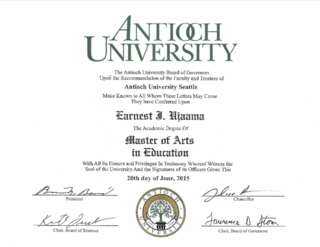A Master of Business Administration is a postgraduate degree focused on business administration. The core courses in an MBA program cover various areas of business administration such as accounting, applied statistics, human resources, business communication, business ethics, business law, strategic management, business strategy, finance, managerial economics, management, entrepreneurship, marketing, supply-chain management, and operations management in a manner most relevant to management analysis and strategy. It originated in the United States in the early 20th century when the country industrialized and companies sought scientific management.

Postgraduate education, graduate education, or graduate school consists of academic or professional degrees, certificates, diplomas, or other qualifications usually pursued by post-secondary students who have earned an undergraduate (bachelor's) degree.

A Bachelor of Arts is a bachelor's degree awarded for an undergraduate program in the liberal arts, or, in some cases, other disciplines. A Bachelor of Arts degree course is generally completed in three or four years, depending on the country and institution.
An academic degree is a qualification awarded to a student upon successful completion of a course of study in higher education, usually at a college or university. These institutions often offer degrees at various levels, usually divided into undergraduate and postgraduate degrees. The most common undergraduate degree is the bachelor's degree, although some educational systems offer lower-level undergraduate degrees such as associate and foundation degrees. Common postgraduate degrees include engineer's degrees, master's degrees and doctorates.
A bachelor's degree or baccalaureate is an undergraduate degree awarded by colleges and universities upon completion of a course of study lasting three to six years. The two most common bachelor's degrees are the Bachelor of Arts (BA) and the Bachelor of Science. In some institutions and educational systems, certain bachelor's degrees can only be taken as graduate or postgraduate educations after a first degree has been completed, although more commonly the successful completion of a bachelor's degree is a prerequisite for further courses such as a master's or a doctorate.

Undergraduate education is education conducted after secondary education and before postgraduate education, usually in a college or university. It typically includes all postsecondary programs up to the level of a bachelor's degree. For example, in the United States, a student pursuing an associate or bachelor's degree is known as an undergraduate student while a student pursuing a master's or doctoral degree is a graduate student. Upon completion of courses and other requirements of an undergraduate program, the student would earn the corresponding degree. In some other educational systems, undergraduate education is postsecondary education up to and including the level of a master's degree; this is the case for some science courses in Britain and some medicine courses in Europe.
An associate degree or associate's degree is an undergraduate degree awarded after a course of post-secondary study lasting two to three years. It is a level of academic qualification above a high school diploma and below a bachelor's degree.

A Master of Science is a master's degree. In contrast to the Master of Arts degree, the Master of Science degree is typically granted for studies in sciences, engineering and medicine and is usually for programs that are more focused on scientific and mathematical subjects; however, different universities have different conventions and may also offer the degree for fields typically considered within the humanities and social sciences. While it ultimately depends upon the specific program, earning a Master of Science degree typically includes writing a thesis.
A Bachelor of Laws is an undergraduate law degree offered in most common law countries as the primary law degree and serves as the first professional qualification for legal practitioners. This degree requires the study of core legal subjects and jurisprudence to provide a comprehensive understanding of the legal system and its function. The LLB curriculum is designed to impart a thorough knowledge of legal principles, legal research skills, and a sound understanding of the roles and responsibilities of lawyers within society. This degree is often a prerequisite for taking bar exams or qualifying as a practising lawyer, depending on the jurisdiction. Additionally, the LLB program also serves as a foundation for further legal education, such as a Master of Laws (LLM) or other postgraduate studies in law.

A thesis, or dissertation, is a document submitted in support of candidature for an academic degree or professional qualification presenting the author's research and findings. In some contexts, the word thesis or a cognate is used for part of a bachelor's or master's course, while dissertation is normally applied to a doctorate. This is the typical arrangement in American English. In other contexts, such as within most institutions of the United Kingdom and Republic of Ireland, the reverse is true. The term graduate thesis is sometimes used to refer to both master's theses and doctoral dissertations.
Doctor of Medicine is a medical degree, the meaning of which varies between different jurisdictions. In the United States, and some other countries, the M.D. denotes a professional degree. This generally arose because many in 18th-century medical professions trained in Scotland, which used the M.D. degree nomenclature. In England, however, Bachelor of Medicine, Bachelor of Surgery (M.B.B.S.) was used and eventually in the 19th century became the standard in Scotland too. Thus, in the United Kingdom, Ireland and other countries, the M.D. is a research doctorate, honorary doctorate or applied clinical degree restricted to those who already hold a professional degree (Bachelor's/Master's/Doctoral) in medicine. In those countries, the equivalent professional degree to the North American, and some others' usage of M.D. is still typically titled Bachelor of Medicine, Bachelor of Surgery.

The British undergraduate degree classification system is a grading structure used for undergraduate degrees or bachelor's degrees and integrated master's degrees in the United Kingdom. The system has been applied, sometimes with significant variation, in other countries and regions.
A Master of Laws is an advanced postgraduate academic degree, pursued by those either holding an undergraduate academic law degree, a professional law degree, or an undergraduate degree in a related subject. In most jurisdictions, the LL.M. is the advanced professional degree for those usually already admitted into legal practice.
A medical school is a tertiary educational institution, professional school, or forms a part of such an institution, that teaches medicine, and awards a professional degree for physicians. Such medical degrees include the Bachelor of Medicine, Bachelor of Surgery, Master of Medicine, Doctor of Medicine (MD), or Doctor of Osteopathic Medicine (DO). Many medical schools offer additional degrees, such as a Doctor of Philosophy (PhD), master's degree (MSc) or other post-secondary education.
Latin honors are a system of Latin phrases used in some colleges and universities to indicate the level of distinction with which an academic degree has been earned. The system is primarily used in the United States. It is also used in some Southeastern Asian countries with European colonial history, such as Indonesia and the Philippines, and African countries such as Zambia and South Africa, although sometimes translations of these phrases are used instead of the Latin originals. The honors distinction should not be confused with the honors degrees offered in some countries, or with honorary degrees.
A Bachelor of Medicine, Bachelor of Surgery is a medical degree granted by medical schools or universities in countries that adhere to the United Kingdom's higher education tradition. Despite the historical distinction in nomenclature, these degrees are typically combined and conferred together. This degree is usually awarded as an undergraduate degree, but it can also be awarded at graduate-level medical institutions. The typical duration for completion is five to six years.

A Master of Arts is the holder of a master's degree awarded by universities in many countries. The degree is usually contrasted with that of Master of Science. Those admitted to the degree have typically studied subjects within the scope of the humanities and social sciences, such as history, literature, languages, linguistics, public administration, political science, communication studies, law or diplomacy; however, different universities have different conventions and may also offer the degree for fields typically considered within the natural sciences and mathematics. The degree can be conferred in respect of completing courses and passing examinations, research, or a combination of the two.
A Doctor of Philosophy is a terminal degree that usually denotes the highest level of academic achievement in a given discipline and is awarded following a course of graduate study and original research. The name of the degree is most often abbreviated PhD, pronounced as three separate letters.

A Bachelor of Science is a bachelor's degree that is awarded for programs that generally last three to five years.

"Pop/Stars" is a song by virtual K-pop girl group K/DA. It was released as a single on November 2, 2018, as promotion for the 2018 League of Legends World Championship. The single became popular with one of the fastest viewership records for its music video on YouTube. Soyeon and Miyeon from (G)I-dle, Madison Beer and Jaira Burns provided vocals for the song and represented the group as its human counterpart in the live performance at the finals of the tournament.








